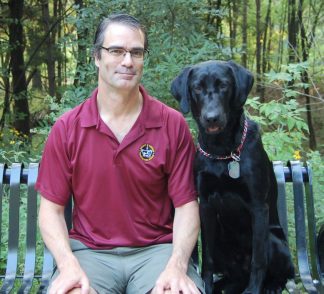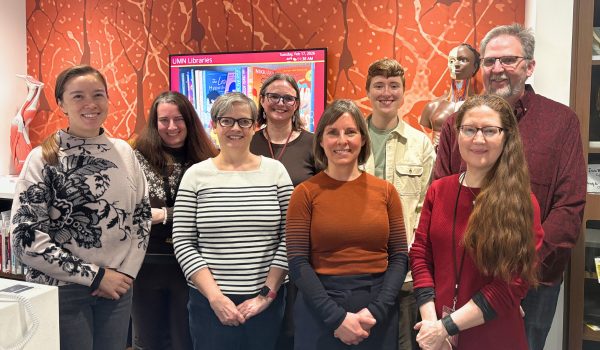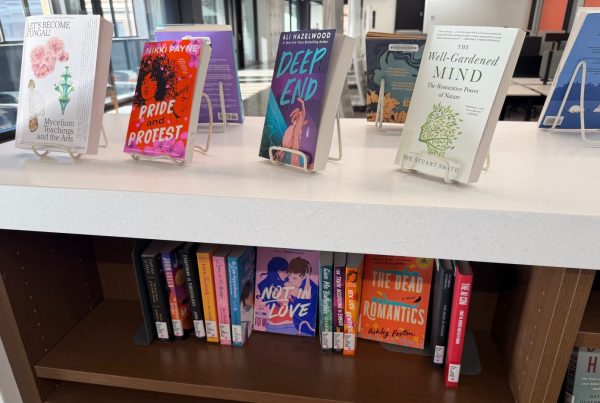By Allison Campbell-Jensen
The waves of change started moving for the Veterinary Medical Library long before it closed as a physical location in mid-2020. Veterinary Librarian André Nault already had noted that, due to the large amounts of time students spent in classrooms and the shift to electronic formats, users did have or did not take time to come to the library.
The library’s resources and its librarian, however, remain accessible in new places and new ways. Says College of Veterinary Medicine Dean Laura Molgaard: “With the loss of our physical library about a year ago, [Nault’s] integrated presence has become even more essential to keep the libraries real and tangible for our faculty, students, and staff.”
As for the collection, the core textbooks are in the process of being moved to Magrath Library. The majority of the journals are accessed electronically, so that has not changed. For journals in print format, users can obtain scans by request through the Libraries’ Interlibrary Loan and Digital Delivery office. There’s the promise of more changes in the future, says Nault.
Moving in new ways
“André embodies the spirit of service.”
—CVM Associate Dean of Education Peggy Root Kustritz
One innovation that began during COVID and will continue is Nault’s development of a Canvas course page that lists all the support materials from College of Veterinary Medicine (CVM) syllabi.
“The really nice thing about this is that students live in Canvas, so it is a natural part of students’ workflow,” he says. About 98% of students have signed up for this optional “course” that has direct links to all the resources in the catalog. And when one student posts a question to the discussion boards, everyone can see the Nault’s answer.
“André embodies the spirit of service,” says CVM Associate Dean of Education Peggy Root Kustritz. “He has assisted me with identifying materials for courses that could be made readily available to students with cost and disability concerns, and with literature searches for educational and medical research — and has partnered with me in preparation of educational research manuscripts.”
The need to connect remotely while working from home has involved all librarians, but they have adapted differently to the challenge. For Nault, moving to a schedule that included weekends made sense. “I can be more responsive,” he says. “Some people just don’t have time to get to things until the weekend. So now I’m responding to them pretty fast, on a Saturday or Sunday, and it allows them to get their work done.”
To be clear, he is not working 8 hours a day, seven days a week. “If I need to take a few hours off during the day to walk my dog, I can do it,” he says, noting that he likes the workflow, but others may not, or may not have the flexibility. “I don’t feel stressed out even though I’m doing work on the weekend. I think that’s what the college appreciates; they like it, I like it, so that relationship works.”
Moving while imbedded in the college
This fall for the first time, Nault will have two hours on the orientation schedule to spend with the entire group of new graduate students. In the past, he only spoke to a subset, so he’s enthusiastic about this opportunity. He is embedded in the College to an unusual degree, participating in such work as the Doctor of Veterinary Medicine admissions interviews.
“In addition to the traditional roles he plays as our librarian, he is an integral part of our professional school curriculum,” Molgaard says. He has a position as an adjunct assistant professor in the college. Nault takes part in teaching the year-long Gopher Orientation and Leadership Experience (GOALE) course. “It’s a one credit course that looks to improve all their nonclinical skills — self-awareness, stress management, team-building, and diversity and inclusion,” he says.
“The skill sets [GOALE emphasizes] really allow a veterinarian to succeed in the workplace” as they strengthen areas in which they may be lacking and learn to understand better the lenses with which they view the world.
He also oversees a professional development course that helps students explore their career options. The four-course series, however, is currently being examined for an overhaul.
“The College is very progressive; they never rest on their laurels, they are constantly retooling and figuring out better ways, and being very responsive to student needs,” Nault says. That means his job is dynamic, as he adapts to waves of change.
Moving with researchers
Large Animal Surgery Professor Erin Malone appreciates Nault’s help with research, including reference management and literature reviews. She is not the only one.
“One thing that happened in the wake of COVID,” Nault says, “is that a lot of people were at home, ‘Hey, it’s a good time to do a systematic review.’ So my requests to support those has increased significantly. Right now, I’m helping with three poultry ones, one is starting now on surgery-related infections in dogs, and one is on the persistence of antibiotics in the aquatic environment.”
Systematic reviews can be powerful. Written with a resident and faculty member, Nault co-authored a review in Veterinary Surgery on treating pericardial effusion in dogs. When fluid fills the space surrounding the heart, does evidence support draining the fluid? “Our literature review showed no real benefit from doing that procedure,” Nault says.
In response to the article, another veterinary surgeon wrote a letter to the editor, questioning the findings, and referencing his own clinical experience. “That’s exactly why we wrote the article, because you can’t rely primarily on your clinical experience,” says Nault, with a wry laugh. “Clinicians need to balance that with peer-reviewed literature.”
Moving forward
Looking ahead, Nault recognizes that with the closure of the physical library, students will be seeking places to study. Along with hoping the veterinary students find Magrath study spaces to be welcoming, the College is examining their spaces to see if there are any available to refurbish.
For this fall semester, Nault will be in his new office in the Animal Science Veterinary Medicine Building 235G several days a week. He also extends an invitation to visit his new black lab, Pogo, who will often be in his office. His office hours are not yet set but his commitment to the College remains high, as is the esteem in which he is held.
“André Nault is a tremendous asset to the College of Veterinary Medicine,” Molgaard says.





